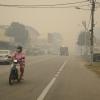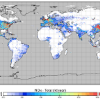The PM Group focusses on solving immediate and near-term environmental (health and ecosystems impacts from pollution), climate (non-CO2 greenhouse gases), and social (widening inequality gaps) problems in a cost-effective way, providing support to policymaking at local and regional scales.
The PM Group addresses sustainability challenges in the near and long term through an improved understanding of the multiple benefits of policies and their distribution across society. The group has a strong focus on the development of new approaches for multi-sectoral policy interventions to manage pollution across different media (air, water, and soil) at various scales to address near-term concerns and enable long-term transformations and their public support towards a sustainable future. In particular, the group endeavors to enhance the systems perspective approach to address and explore issues such as the interactions and environmental impacts of pollution; assessment of sources of non-CO2 greenhouse gases; mitigation opportunities; approaches to address nutrient and material cycling; options for more equitable solutions; and improved methods for estimating the health and economic benefits of policy interventions.
Models, tools, datasets
Policy applications
22 February 2023
Centre for Integrated Assessment Modelling (CIAM)

22 February 2023
GAINS analyses for the 2009 United Nations Climate Change Conference - COP15 in Copenhagen

22 February 2023
Pollution Management in Developing Countries

Pagination
Projects
Staff
News

21 February 2025
Vietnamese Ambassador and IIASA discuss strengthening research collaboration

20 December 2024
Increase in electric vehicles could create unwanted pollution hotspots

19 November 2024
IIASA researchers recognized on Clarivate’s 2024 Highly Cited Researchers™ List
Events
Focus

30 March 2024
Transforming waste into a valuable resource
As the world marks the International Day of Zero Waste, Adriana Gómez-Sanabria highlights that the path to zero waste will require a shift in society’s current consumption and production patterns. Originally conceived to shield humanity and the environment from the fallout of our actions, waste management systems must now evolve into engines of sustainability.
04 October 2023
ENGAGE Summary for Policymakers

Publications
Wang, J., Wang, Y., Zhang, S. , & Yi, B. (2025). Drivers of environmental externality reduction in China's electric power industry: A spatial-temporal analysis. Journal of Environmental Management 373 e123612. 10.1016/j.jenvman.2024.123612. Ren, K., Tang, X., Huang, C., Willerström, J., & Höök, M. (2025). Prospective metal requirements assessment of China's wind-power and photovoltaics: Implications for emerging anthropogenic mines. Resources, Conservation and Recycling 215 e108088. 10.1016/j.resconrec.2024.108088. Ren, M., Zhu, B., Huang, C., Wang, J., & Dai, H. (2025). Multidimensional sustainability implications of alternative iron and steel industry decarbonization strategies in China. Resources, Conservation and Recycling 215 e108136. 10.1016/j.resconrec.2025.108136. Cui, J., Gao, Y., van Grinsven, H., Zheng, M., Zhang, X., Ren, C., Ma, T., Xu, J., & Gu, B. (2025). Adaptive Mitigation of Warming-Induced Food Crisis and Nitrogen Pollution. Environmental Science & Technology 10.1021/acs.est.4c05531. (In Press) Zusman, E., Akahoshi, K., Hanaoka, T., Malley, C.S., Wangwongwatana, S., Onmek, N., Paw-armart, I., Nguyen Thi, K.O., Nguyen Huy, L., Kuylenstierna, J.C.I., Hirayama, T., Goto, Y., Kazumasa, K., Amann, M., Klimont, Z. , & Slater, J. (2025). The truth about co-benefits: a multidimensional feasibility assessment for thailand and beyond. Environmental Research Communications 7 (2) e025009. 10.1088/2515-7620/adae5e.









